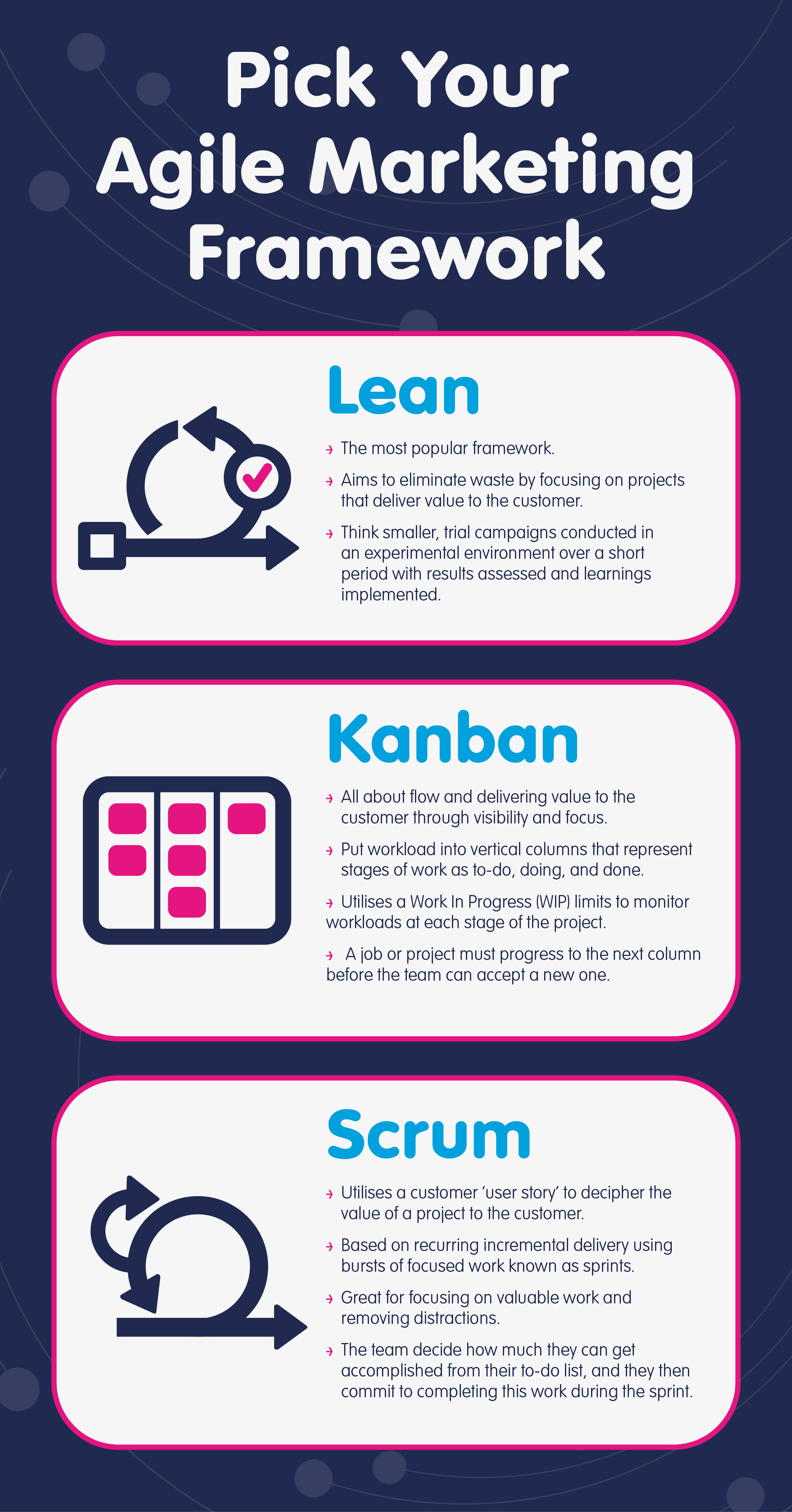
When you stop to think about it, your marketing team is probably one of the busiest teams in your business. Not only are they the people you turn to when sales are stagnating, but they are also responsible for rolling out your campaigns, capturing leads, tracking and analysing sales, running your socials, collaborations, and so much more.
Wouldn’t it make sense to give your marketing team the tools and flexibility they need to drive your brand to the forefront of your industry? Wouldn’t it help your business if this team was work-ing effectively and efficiently? If your answer is a strong yes, then the Agile methodology might be the project management tool you’ve been searching for.
Why Consider Agile Marketing?
If 2020 has taught us anything about succeeding in business, it would have to be that to remain relevant we must adapt. And while business has evolved Agile Marketing is one tried and testing project management framework tool that can be integrated into your business today to reap big rewards for the future.
We all like the idea of our marketing team being able to move quickly, to respond, and be flexible and these are the foundations upon which Agile Marketing exists. Once you get your head around the principles, you can easily integrate this framework into your current marketing framework enabling a simple, streamlined team structure, communication, processes and work-flows which lead to marketing performance optimisation.
And let’s face it, in today’s fast-paced environment, consumers expect companies like yours to keep up to speed with the flow of the world. Digital transformation means your business is in-creasing, if not online. To be seen as stale or behind online is a death wish in today’s fast-paced digital economy. To remain relevant we must ensure our teams have the framework and the tools to keep ahead of the competition and remain flexible to adjust to what might come next. Whatever that might be.
Adopting the foundations of Agile Marketing enables your marketing team to speed up the pro-cesses that govern the actioning of a project, therefore reducing the amount of time spent in un-productive meetings, while maximising the time spent being creative and working towards com-pleting a project. In short, Agile Marketing makes your marketing team more effective and who doesn’t want that?
Sounds pretty good on paper, doesn’t it. I mean, who doesn’t want to appear agile. Now let’s ex-plore the details of Agile Marketing.
What Is Agile Marketing?
To be agile is to move quickly and easily and when related to project management, it is charac-terised by the division of tasks into short phases of work and frequent reassessment and adap-tion of plans. Sounds like a simple plan for success, right?
In a nutshell, Agile Marketing is a strategic marketing approach that encourages teams to place focused efforts on high-value projects, to then complete these projects as a team, measure their effectiveness, and then after evaluation, improve the results over time.
Agile Marketing says goodbye to the rigid ‘big campaigns’ and months spent on projects that prove to be less successful than projected. Instead, Agile Marketing encourages short spurts of intensive work on projects that are collectively deemed by your team as being as high value. It enables your marketing team to improve their speed, predictability, transparency, and adaptabil-ity while working effectively together towards a united goal. It’s great for boosting morale, strengthening team dynamics, and your business.
With an Agile Marketing framework, your marketing team will have the flexibility to respond im-mediately to changes in the market, create campaigns that can be tested, evaluated and opti-mised, develop the ability to identify what works for your business, and what doesn’t, and have a collection of tried and tested data to justify their elected projects and campaigns.
Also, it's important to note that by embracing Agile Marketing you understand it is ok for a project to be unsuccessful as long as the lessons are learned, and taken on board to increase the potency of future projects.
Where did the Agile Methodology come from?
Agile was created by software developers in the '90s and has since been adapted very success-fully by marketers. Some of the biggest and most successful companies in the world have uti-lised Agile frameworks including the likes of Apple, IBM, and Microsoft.
It wasn’t until 2001 that the Agile methodology was formalised as a philosophy and a concise summary called the Agile Manifesto was composed by a group of developers. While this manifesto forms the basis of the Agile Marketing framework, today the project management tool is utilised by companies of all scales and prominence.
Know The Values and Principles
Before you call a meeting with your marketing team to tell them about the new way they are go-ing to be working, it's important to get up close and personal with the values and principles that make up the Agile methodology. These include:
-
Validated learning over opinions and conventions - Is there a better way to achieve your goal, and how will you know if you don’t try it? Agile Marketing allows you team to choose experi-mentation over the best practice to unpack what works best for your company. Think small experiments rolled out rapidly and regularly followed up by evaluation and further refinement.
-
Customer-focused collaboration over silos and hierarchy - While silos encourage knowledge-hoarding, Agile Marketing turns the focus back onto your customer enabling knowledge to dis-tribute freely to allow customer-centric marketing that delivers better results.
-
Adaptive and iterative campaigns over Big-Bang campaigns - Forget about rolling out a new campaign every quarter and instead embrace adaptive, interactive campaigns that evolve based on the environment upon which they are created. Adaptive campaigns are less risky because they take less time and fewer resources to roll out.
-
The process of customer discovery over static prediction - Life is about learning, and so is marketing which is why we never stop learning about our customer in Agile Marketing. By re-fining who you are communicating with as your customer, you can make a more responsive decision about how you interact with them as a brand.
-
Flexible versus rigid planning - while Agile Marketing is pre-planning, it must be said that the plans do have a little more give in them. It’s essential to be adaptive
-
Responding to change over following a plan - Again, back to being, well agile, it’s important to acknowledge when the plan needs to change to be successful, instead of blindly following the plan that is doomed to be unsuccessful for the sake of following the plan.
-
Many small experiments over a few large bets - By working smaller projects rather than big campaigns, Agile Marketing allows teams to gain confidence through low-risk, experimental projects that can be applied to future projects.
What Does Agile Marketing Allow Your Marketing Team To Do:
Embracing an Agile Marketing framework is a win-win situation for your business. Your market-ing team are going to feel empowered, informed, and they can drive your marketing campaigns to success, fast. They will also have the framework to:
-
Respond quickly to changes in the market
-
Produce rapid campaigns that can be tested and optimised over time
-
Try lots of things and repeat the ones that succeed
-
Use input from other departments to augment marketing efforts
-
Justify choices in campaigns and projects with hard data
-
Collaborate with team members to prevent a tunnel-vision approach to marketing
Pick Your Framework
There are three key frameworks to pick from when using Agile Marketing, Lean, Kanban and Scrum. It’s important to note that while it is fine to pick one or the other, many marketing teams create their hybrid framework that results in a combination of two or even three of the frame-works. Remember, agile by nature, Agile Marketing has the additional benefit of being flexible, meaning your marketing team can take the foundations of either framework and implement it in a way that will work within your business and workforce.
Know What Makes Agile Marketing Tick
Regardless of what framework you choose, there are a few things that must be incorporated into Agile Marketing to make it successful for your team.
The first is what is known as Daily Standup, and this is a short, yet effective team meeting. It al-lows each team member to identify that they are working on and to discuss any blocks they are encountering to getting their part of the project complete on time. The Agile methodology en-courages self-managed teams that can evaluate what they are doing today, how did they go yesterday, and what problems they need to overcome from tomorrow to move forward today.
The next component is teamwork, and without this vital element, Agile Marketing cannot work. The very nature of Agile relies on bringing together a talented team of individuals to work collab-oratively towards a collective goal. An Agile Marketing framework can be adopted by a team of any size. The big thing here is that everyone is on board.
And finally, there needs to be either a physical or online software tool to track the progress of each project. This can be a big whiteboard in the meeting room covered in coloured sticky notes or a sophisticated online organisation tool. It doesn’t matter, as long as each member of your team has access to the planning tool while they are working on the project at hand.
Time To Integrate
If you like the idea of Agile Marketing but it all seems too complicated to implement into your current marketing team, then finding a , and gain the results you need quickly and effectively.
Fileroom is about your business growth and future-proofing your sales revenue. We work with you to achieve this through purpose-fit content at every stage of your buyers' journey, paired with digital enablement, deep-data, and artificial intelligence so you can focus on what you do best for your customers.
If you would like to discover how implementing Agile Marketing could change up your marketing efforts, fileroom is here to help. Start a conversation with fileroom today.



.png)





